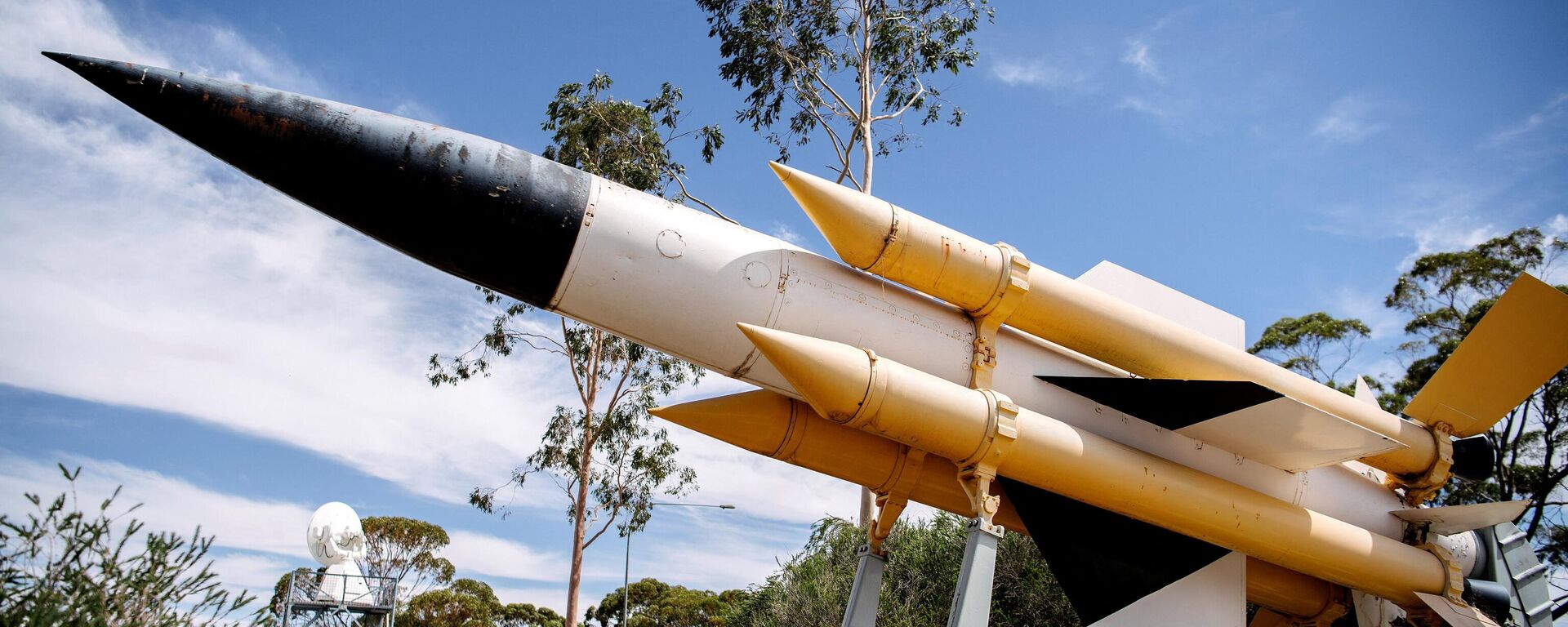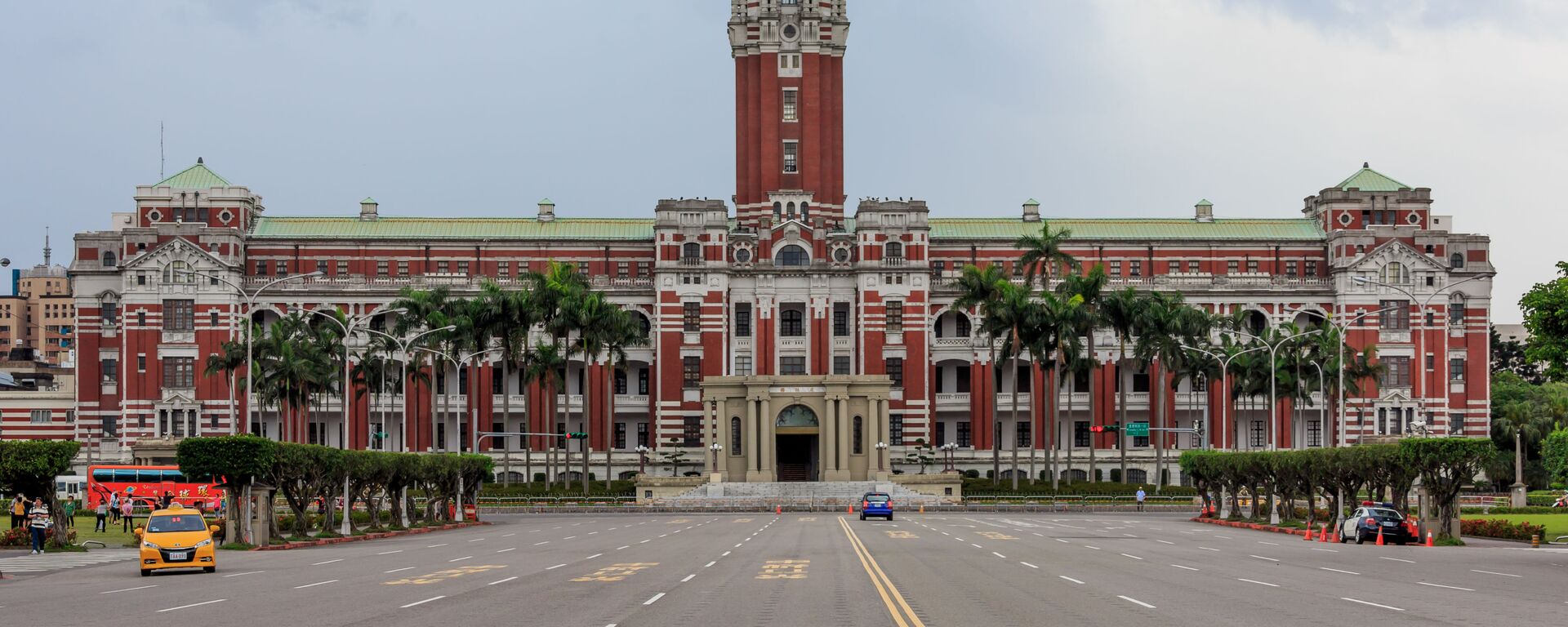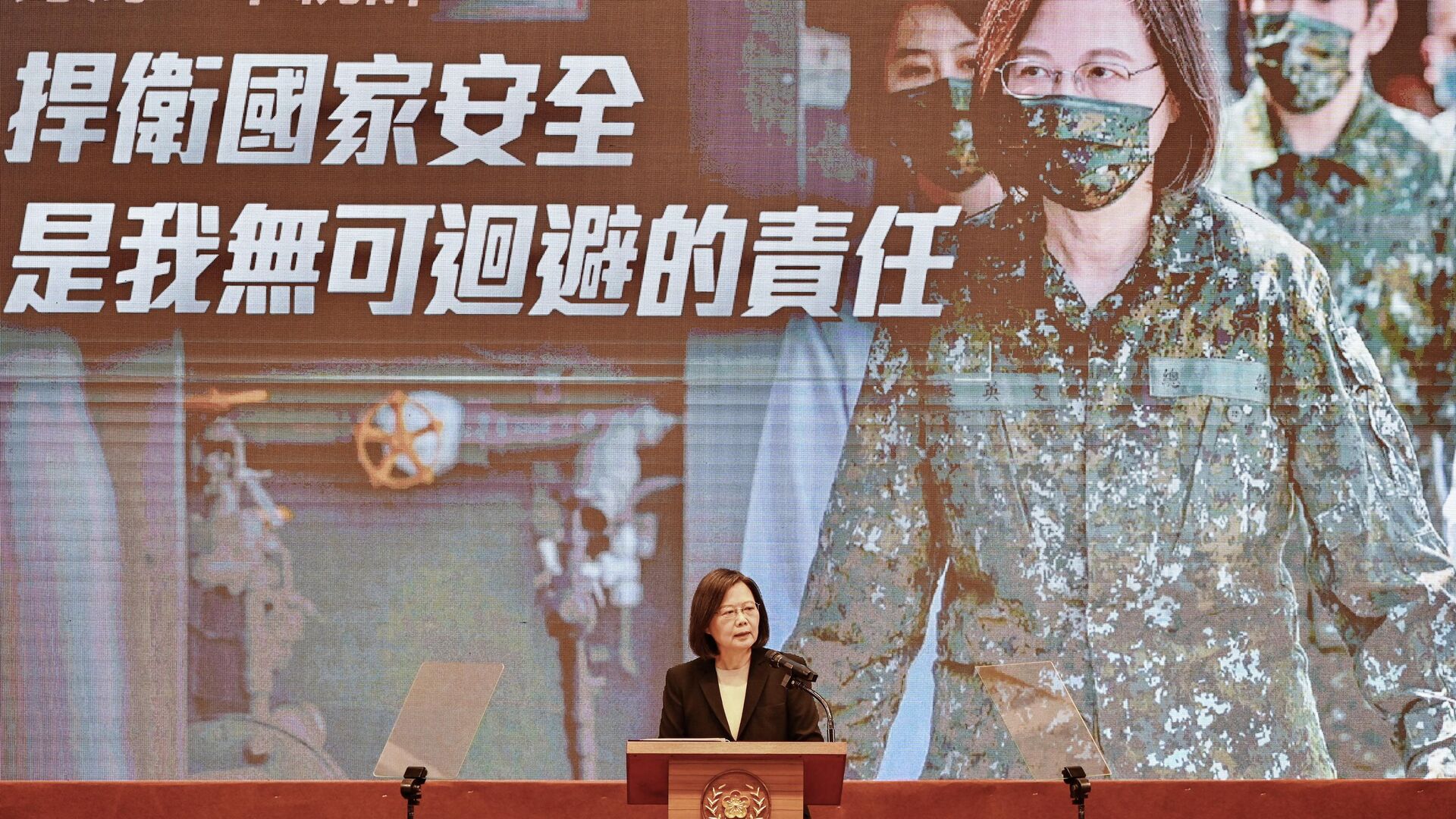https://sputnikglobe.com/20221227/taipei-triples-compulsory-military-service-time-as-taiwan-strait-tensions-persist-1105828091.html
Taiwan Triples Compulsory Military Service Time as Cross-Strait Tensions Persist
Taiwan Triples Compulsory Military Service Time as Cross-Strait Tensions Persist
Sputnik International
Tensions between Beijing and Taipei jumped in August after US House Speaker Nancy Pelosi visited Taiwan, kicking off a series of trips to the island by US and European diplomatic delegations. The strain appeared to lessen last month after the China-moderate Kuomintang Party made gains against the ruling Progressive Democrats in local elections.
2022-12-27T16:53+0000
2022-12-27T16:53+0000
2023-06-19T12:45+0000
us-china tensions over taiwan
tsai ing-wen
china
military
conscription
taiwan
https://cdn1.img.sputnikglobe.com/img/07e6/0c/1b/1105827704_0:159:3077:1890_1920x0_80_0_0_d29fa6866939239863940dd9e698c3d0.jpg
Taiwan’s compulsory military service period for men has tripled from four months to one year. The extension, announced by President Tsai Ing-wen on Tuesday, will go into effect on January 1, 2024.Along with the extension of the mandatory service period, Taipei’s plans include an increase in the stipend paid out to conscripted troops – from the equivalent of about $210 now to $855 US in 2024 (Taiwan’s minimum wage of about $820 US).Currently, just 10 percent of Taiwan’s 188,000-troop strong military consists of conscripts, with the majority made up by professional career soldiers. The country also has a reserve pool of about 1.6 million men.Successive Taiwanese governments have tinkered with conscription laws repeatedly since the early 1950s, with Taipei making plans to do away with mandatory military service entirely by the mid-2010s, but pushing back the deadline repeatedly, and gradually shortening conscription time from two years to one year, and then to the current four months. All men of military age (18) are required to serve. Women are not conscripted, but can volunteer (about 15 percent of the Taiwanese military is made up of women).Beijing has repeatedly slammed Washington for its sale of hundreds of billions of dollars of military hardware to Taiwan over the decades, calling it a violation of agreements reached in the 1980s, which required the US to gradually phase out such aid over time.Taiwanese Deputy Defense Minister Po Horng-huei said that the return to a one-year conscription period would include a more rigorous training regimen, including training involving the use of Javelin anti-tank, Kestrel anti-armor and Stinger anti-air missiles.Whether Taiwan’s troops will actually see these missiles remains unclear at the moment amid revelations that billions of dollars in military hardware ordered by Taipei from Washington as far back as 2015 still hasn’t been delivered.Tensions between Taiwan and mainland China jumped dramatically in August after Nancy Pelosi, the third senior-most official in the US, led a delegation to the island. China, which has repeatedly slammed any foreign efforts to engage diplomatically with Taipei in violation of the One-China policy, responded with a series of large-scale military drills around the island.In his address to the 20th Congress of the Chinese Communist Party in October, Chinese President Xi Jinping emphasized that Beijing is committed to the peaceful reunification of Taiwan with the mainland under the ‘One Country, Two Systems’ model, but reiterated that Beijing would “never compromise to renounce the use of force” in the face of threats posed by foreign forces and Taiwan separatists.Tensions between Beijing and Taipei, which have been building throughout the Biden presidency amid the US president’s repeated pledges to break with Washington’s long-held policy of “strategic ambiguity” in favor of “defending” Taiwan, have eased over the past month after the opposition nationalist Kuomintang Party trounced Tsai’s Democratic Progressives in local elections, possibly setting the stage for a change of power in the 2024 presidential elections. President Tsai resigned as party chairwoman in the aftermath of her party’s poor showing.The Kuomintang Party are the successors to the Kuomintang nationalist forces led by Chiang Kai-shek, who fled to Taiwan in 1949 after being defeated by the communists in the Chinese Civil War. The party has historically had much more cordial relations with the mainland than the Democratic Progressives, whose attempts to strengthen diplomatic contacts abroad and challenge the 1992 Consensus agreement have enraged Beijing. The Kuomintang has sought to avoid antagonizing the People’s Republic in recent decades, and some of its politicians have even envisioned reuniting with the mainland under the ‘One China, Two Systems’ model presently applied to Hong Kong and Macau.
https://sputnikglobe.com/20221227/australia-reportedly-planning-to-deploy-new-missile-systems-amid-china-taiwan-tensions-1105826901.html
https://sputnikglobe.com/20221127/taiwans-ruling-dpp-party-suffers-major-loss-in-local-elections-1104740628.html
china
taiwan
Sputnik International
feedback@sputniknews.com
+74956456601
MIA „Rossiya Segodnya“
2022
News
en_EN
Sputnik International
feedback@sputniknews.com
+74956456601
MIA „Rossiya Segodnya“
Sputnik International
feedback@sputniknews.com
+74956456601
MIA „Rossiya Segodnya“
taiwan tensions, taiwan, conscription, china, people's republic of china, republic of china, conscript, tsai ing-wen
taiwan tensions, taiwan, conscription, china, people's republic of china, republic of china, conscript, tsai ing-wen
Taiwan Triples Compulsory Military Service Time as Cross-Strait Tensions Persist
16:53 GMT 27.12.2022 (Updated: 12:45 GMT 19.06.2023) Tensions between Beijing and Taipei jumped in August after US House Speaker Nancy Pelosi visited Taiwan, kicking off a series of trips to the island by US and European diplomatic delegations. The strain appeared to lessen last month after the China-moderate Kuomintang Party made gains against the ruling Progressive Democrats in local elections.
Taiwan’s compulsory military service period for men has tripled from four months to one year. The extension, announced by President Tsai Ing-wen on Tuesday, will go into effect on January 1, 2024.
“No one wants war. This is true of Taiwan’s government and people, and the global community, but peace will not drop from the sky, and Taiwan is at the front lines of the expansion of authoritarianism,” Tsai said, announcing the conscription reform measures at a news conference after holding a meeting of the island’s top national security body. “Taiwan wants to tell the world that between democracy and dictatorship, we firmly believe in democracy. Between war and peace, we insist on peace. Let us show the courage and determination to protect our homeland and defend democracy,” Tsai said.
Along with the extension of the mandatory service period, Taipei’s plans include an increase in the stipend paid out to conscripted troops – from the equivalent of about $210 now to $855 US in 2024 (Taiwan’s minimum wage of about $820 US).
Currently, just 10 percent of Taiwan’s 188,000-troop strong military consists of conscripts, with the majority made up by professional career soldiers. The country also has a reserve pool of about 1.6 million men.
Successive Taiwanese governments have tinkered with conscription laws repeatedly since the early 1950s, with Taipei making plans to do away with mandatory military service entirely by the mid-2010s, but pushing back the deadline repeatedly, and gradually shortening conscription time from two years to one year, and then to the current four months. All men of military age (18) are required to serve. Women are not conscripted, but can volunteer (about 15 percent of the Taiwanese military is made up of women).
The American Institute in Taiwan,Washington’s de facto embassy in Taipei, praised Tsai’s comments, saying in a statement that the planned longer conscription period “underscores Taiwan’s commitment to self-defense,” and “strengthens deterrence.” The institute promised to “continue to assist Taiwan in maintaining a sufficient self-defense capability in line with our commitments under the Taiwan Relations Act and our One China policy.”
Beijing has repeatedly slammed Washington for its sale of hundreds of billions of dollars of military hardware to Taiwan over the decades, calling it a violation of agreements reached in the 1980s, which required the US to gradually phase out such aid over time.

27 December 2022, 15:59 GMT
Taiwanese Deputy Defense Minister Po Horng-huei said that the return to a one-year conscription period would include a more rigorous training regimen, including training involving the use of Javelin anti-tank, Kestrel anti-armor and Stinger anti-air missiles.
Whether Taiwan’s troops will actually see these missiles remains unclear at the moment amid revelations that
billions of dollars in military hardware ordered by Taipei from Washington as far back as 2015 still hasn’t been delivered.
Tensions between Taiwan and mainland China jumped dramatically in August after Nancy Pelosi, the third senior-most official in the US, led a delegation to the island. China, which has repeatedly slammed any foreign efforts to engage diplomatically with Taipei in violation of the One-China policy, responded with a series of large-scale military drills around the island.
In his address to the 20th Congress of the Chinese Communist Party in October, Chinese President Xi Jinping emphasized that Beijing is committed to the peaceful reunification of Taiwan with the mainland under the ‘One Country, Two Systems’ model, but
reiterated that Beijing would “never compromise to renounce the use of force” in the face of threats posed by foreign forces and Taiwan separatists.
Tensions between Beijing and Taipei, which have been building throughout the Biden presidency amid the US president’s repeated pledges to break with Washington’s long-held policy of “strategic ambiguity” in favor of “defending” Taiwan, have eased over the past month after the opposition nationalist Kuomintang Party trounced Tsai’s Democratic Progressives in local elections, possibly setting the stage for a change of power in the 2024 presidential elections. President Tsai resigned as party chairwoman in the aftermath of her party’s poor showing.
The Kuomintang Party are the successors to the Kuomintang nationalist forces led by Chiang Kai-shek, who fled to Taiwan in 1949 after being defeated by the communists in the Chinese Civil War. The party has historically had much more cordial relations with the mainland than the Democratic Progressives, whose attempts to strengthen diplomatic contacts abroad and challenge the 1992 Consensus agreement have enraged Beijing. The Kuomintang has sought to avoid antagonizing the People’s Republic in recent decades, and some of its politicians have even envisioned reuniting with the mainland under the ‘One China, Two Systems’ model presently applied to Hong Kong and Macau.

27 November 2022, 01:37 GMT




